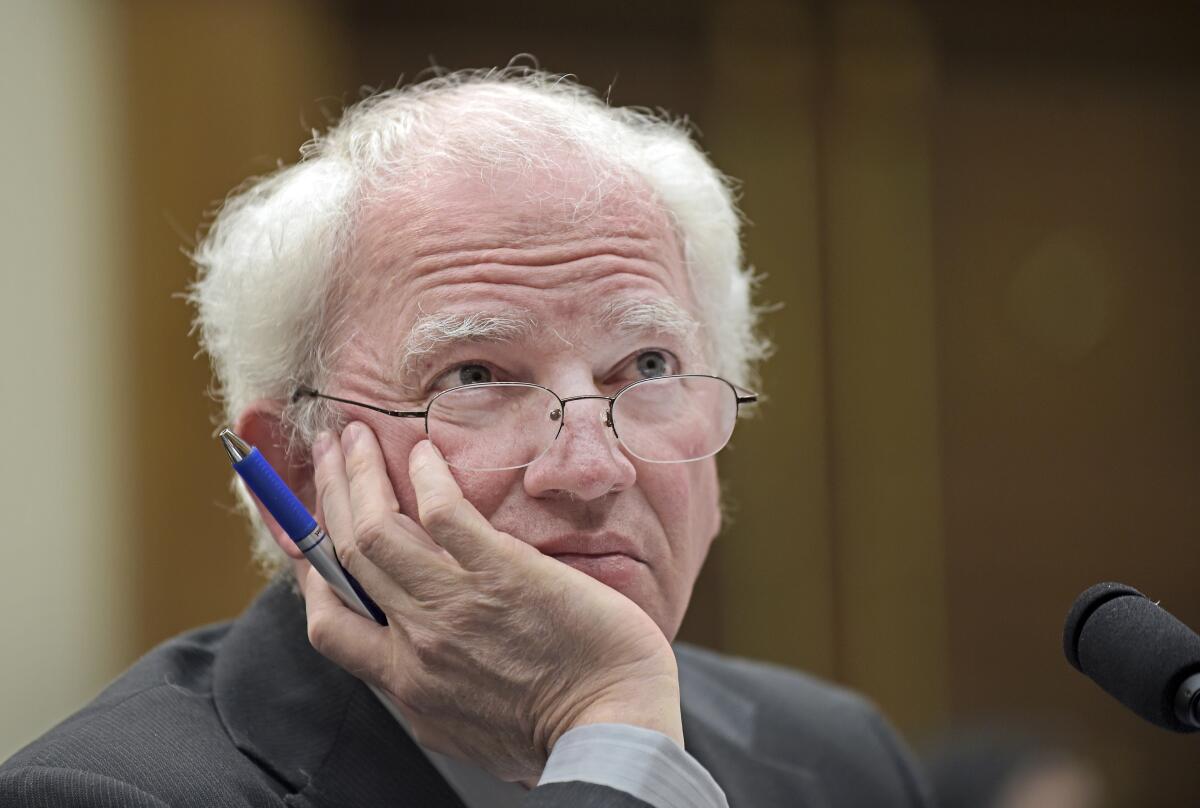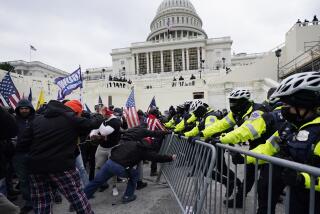Why the Jan. 6 Committee handed out a criminal referral to a former California law professor

Former Chapman University professor John Eastman is among the individuals whom the Jan. 6 committee has recommended face federal criminal charges for their roles in the attack on the Capitol on Jan. 6, 2021.
The committee recommended that Eastman and former President Trump should face federal criminal charges for obstruction of an official proceeding and conspiracy to defraud the United States. It recommended prosecuting “Trump and others” on two additional charges: conspiracy to make a false statement and inciting, assisting, or aiding or comforting an insurrection.
“[Trump] entered into agreements, formal and informal, with several individuals who assisted him with his criminal objects,” Rep. Jamie Raskin (D-Md.) said during Monday’s committee hearing.
In a statement after the referrals were announced, Eastman said the referral of charges from the committee to the Justice Department “carries no more legal weight than a ‘referral’ from any American citizen.”
“In fact, a ‘referral’ from the January 6th committee should carry a great deal less weight due to the absurdly partisan nature of the process that produced it,” Eastman said.
Who is John Eastman?
Eastman’s theory that former Vice President Mike Pence could reject or delay the certification of state electors was essential to Trump’s effort to convince his base that the election was being stolen. Eastman was central to “the development of a legal strategy to justify a coup,” according to Douglas Letter, the general counsel to the House of Representatives.
Eastman was also involved with a scheme to appoint alternate slates of Trump electors who could vote him back into office after he lost the 2020 election.
Eastman is already under investigation. Justice Department investigators searched his cellphone and emails earlier this year. In a March court filing, the Jan. 6 committee alleged Eastman and Trump were a part of a “criminal conspiracy” to overturn the 2020 election.
“[Eastman’s] role was not simply as an advisor; he spoke at the rally on the morning of January 6, spreading falsehoods to tens of thousands of people,” the committee wrote.
Eastman was interviewed by the committee in 2021, but invoked his 5th Amendment rights against self-incrimination. Along with Trump and Eastman, the Committee recommended charges against former Trump Chief of Staff Mark Meadows, former Justice Dept. official Jeffrey Clark and former Trump Lawyer Rudy Giuliani.
Eastman has deep ties to Southern California and the conservative movement.
What’s Eastman’s background?
Eastman, 62, was born in Lincoln, Neb., and holds a bachelor’s degree in politics and economics from the University of Dallas, a law degree from the University of Chicago Law School and a doctorate in government from the Claremont Graduate School in Claremont.
Before joining Chapman University’s law school in 1999, Eastman clerked for conservative Supreme Court Justice Clarence Thomas. (Thomas’ wife, Ginni, was also a focus of the Jan. 6 committee’s investigations.)
Eastman is currently a senior fellow at the Claremont Institute, a right-wing think tank, and founded the Center for Constitutional Jurisprudence.
During his speech at the Ellipse on Jan. 6, 2021, Eastman demanded that Pence “let the legislatures of the states look into this, so we get to the bottom of it, and the American people know whether we have control of the direction of our government or not.”
For the record:
1:57 p.m. Dec. 19, 2022An earlier version of this story said that Chapman University asked for Eastman’s resignation. In fact, a group of faculty and staff called for his resignation, and Eastman resigned before the faculty senate took any action on the matter.
More than 140 Chapman University faculty members and three trustees signed a letter stating Eastman’s actions “should disqualify him from the privilege of teaching law to Chapman students and strip him of the honor of an endowed chair.”
Eastman called the letter “defamatory” and resigned before the faculty senate voted on a resolution against him. Both sides agreed not to sue each other, but Eastman’s connections to Chapman have affected the university’s reputation.
When did Eastman become acquainted with President Trump?
Eastman first officially entered the Trump orbit in the days after the Nov. 3, 2020, election when he was invited by people close to the then-president to help craft a legal memo challenging the election results in Pennsylvania.
In early December 2020, Trump asked him to bring legal action challenging the election directly to the Supreme Court. Eastman made two filings to the court, but the effort quickly failed.
What did Eastman do?
Eastman crafted a legal memo outlining the most politically palatable options for Trump to overturn the 2020 election. He suggested that Pence send the electoral college votes back to states for “recertification” by a new set of electors.
Depositions released by the committee show that Eastman was part of several meetings with Pence’s staff, including a Jan. 4, 2021, Oval Office meeting with Trump and Pence to discuss what authority Pence had.
Eastman “admitted in advance of the 2020 election that Mike Pence could not lawfully refuse to count official elector votes. But he nevertheless… deployed a combination of bogus election fraud claims and the fake electoral ballots to say that Mike Pence, presiding over the joint sessions, could reject legitimate electoral votes for President-elect Biden,” said Rep. Pete Aguilar (D-Redlands) during Monday’s hearing.
Emails released by the committee also show Eastman arguing with Pence’s staff during the riot about what the vice president should do when Congress returned to finish counting the votes.
The committee also highlighted Eastman’s effort to overturn the election even after the attack on the Capitol happened.
“The ‘siege’ is because YOU and your boss did not do what was necessary to allow this to be aired in a public way, so that the American people can see for themselves what happened,” Eastman wrote in an email to Greg Jacob, Pence’s lawyer.
Once the riot at the Capitol ended, Eastman again emailed Jacob to say the vice president should refuse to certify the election and send it back to the states.
Under the Constitution, the vice president oversees the counting of the electoral college votes.
The House recently passed legislation declaring that the role of the vice president in electoral-vote counting is purely ceremonial. The measure is expected to pass the Senate in a spending bill later this month.
Did Eastman stop his efforts to overturn the election after Jan. 6, 2021?
No. Back in June, the committee released video showing a deposition by former White House attorney Eric Herschmann, who discussed a phone call from Eastman the day after the riot. Herschmann remembered Eastman asking him about preserving documentation dealing with the Georgia election that Eastman alleged could potentially be used in an appeal.
“And I said to him, ‘Are you out of your effing mind?’” Herschmann said in the video. “I said, ‘I only want to hear two words coming out of your mouth from now on: ‘orderly transition.’”
Herschmann demanded that Eastman repeat those two words back to him — Eastman eventually did.
“I said, ‘Good, John. Now I’m going to give you the best free legal advice you’re ever getting in your life: Get a great effing criminal defense lawyer. You’re going to need it,’” Herschmann said. “And then I hung up on him.”
Has Eastman’s opinion of the Jan. 6 events changed?
In a letter to the editor in the Wall Street Journal, Eastman denies that he claimed Pence “could unilaterally reject electoral votes and simply declare President Trump reelected.”
“The advice I gave to then-Vice President Pence was that he accede to requests from hundreds of state lawmakers to delay proceedings for a short time so that they could assess the effect of illegalities on the conduct of the election,” he wrote.
More to Read
Get the L.A. Times Politics newsletter
Deeply reported insights into legislation, politics and policy from Sacramento, Washington and beyond. In your inbox three times per week.
You may occasionally receive promotional content from the Los Angeles Times.











